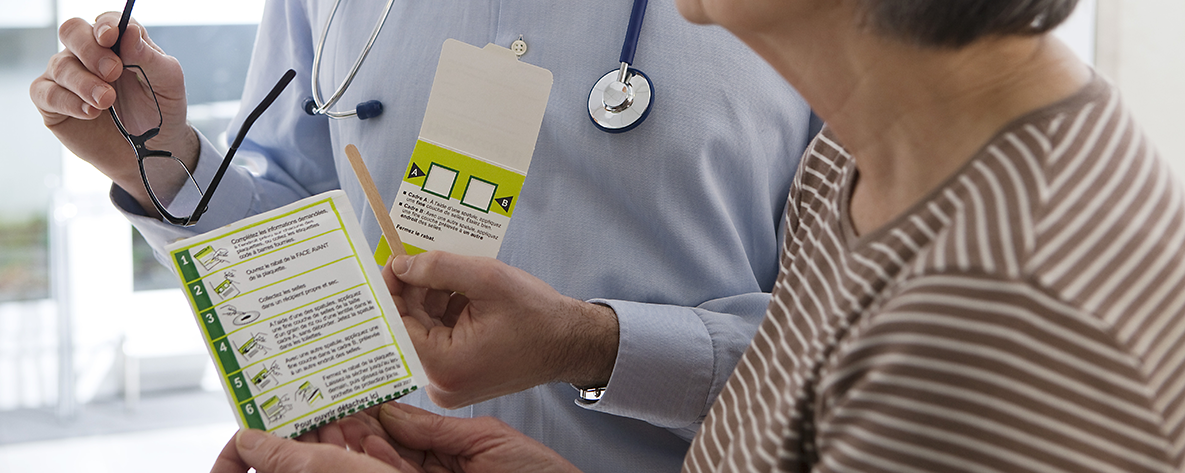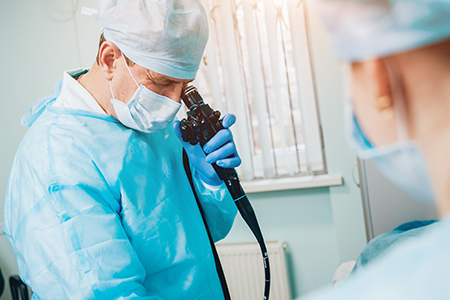What to Know About Colon Cancer Screening

Screening is very important to identify potential issues early. Often, early stage colorectal cancer does not cause symptoms. Colorectal cancer screening is often neglected out of fear or embarrassment.

Colon Cancer
Colorectal cancer is cancer that occurs in the colon or rectum. Most colorectal cancers begin as a growth on the inner lining of the colon or rectum called a polyp.
Some types of polyps can change into cancer over the course of several years, but not all polyps become cancer. The chance of changing into cancer depends on the kind of polyp.
Colorectal polyps and colorectal cancer don’t always cause symptoms, especially at first. That is why getting screened regularly for colorectal cancer is so important.
If symptoms are present, they can include:
- Blood in or on your stool (bowel movement)
- Stomach pain, aches, or cramps that don’t go away
- Unintentional weight loss

Colon Cancer Statistics
Colorectal cancer is the third leading cause of cancer-related deaths in the United States when men and women are considered separately, and the second leading cause of death when both sexes are combined.
One in three people are not up-to-date with their colon cancer screening.

Types of Screening Tests
Fecal Occult Blood Test and Fecal Immunochemical Test (FIT)
A stool sample is tested for blood by adding a chemical that reacts to protein in the blood.
Stool DNA Test
A stool sample is checked for certain abnormal sections of genetic material (DNA) from cancer or polyp cells.
Sigmoidoscopy and Colonoscopy
These tests use a flexible, lighted scope to check for polyps and cancer in the rectum and lower colon.
Double-Contrast Barium Enema
An x-ray test of the colon and rectum.
CT Colonography (virtual colonoscopy)
A type of CT scan of the colon and rectum.

More Information on Screening Tests
Typically, these exams are not painful for the person receiving the screening test.
To get a clear view of the colon, there is a preparation phase to clean out the colon prior to testing. Preps vary and each will come with detailed instructions regarding diet and laxative and/or enema use. While not painful, the preparation process can be cumbersome as you can expect to frequently use the bathroom. Plan to be at home while doing the prep to ensure you are as comfortable as possible.
Stool-based tests like fecal occult blood and DNA tests are less invasive but aren’t as good at finding polyps as tests like a colonoscopy. If the result from one of the stool tests is positive (abnormal), you’ll probably still need a colonoscopy.
Colonoscopies generally take about 30 minutes and are used to examine the entire colon. Sedatives are commonly prescribed so you will need to plan for transportation home after this test.
Sigmoidoscopies take 10-20 minutes and are used to examine about half the colon and the entire rectum. Most people don’t need sedatives to relax, but this may be an option that you can discuss with your health care provider ahead of time.
Double-Contrast Barium Enema and CT Colonography are imaging tests that can be used as alternatives to more invasive tests for certain individuals. They don’t require sedation and can identify concerns. If positive, follow-up will likely include a colonoscopy.

Screening Recommendations
The American Cancer Society recommends starting average-risk screening for everyone at age 45. People at an average risk for developing colorectal cancer should use one of the screening tests below:
Tests that find polyps and cancer:
- Flexible sigmoidoscopy – every 5 years*
- Colonoscopy – every 10 years
- Double-Contrast Barium Enema – every 5 years*
- CT Colonography – every 5 years*
- *Colonoscopy should be done if results are positives.
Test that mainly find cancer:
- Fecal Occult Blood Test – every year
- Fecal Immunochemical Test (FIT) – every year
- Stool DNA Test – every year
If you are at an increased or high risk of colorectal cancer, you might need to start colorectal cancer screening before age 50 and/or be screened more often. The following conditions make your risk higher than average:
- A personal history of colorectal cancer or adenomatous polpys
- A personal history of inflammatory bowel disease (ulcerative colitis or Crohn’s Disease)
- A strong family history of colorectal cancer or polyps
- A known family history of a hereditary colorectal cancer syndrome such as familial adenomatous polyposis (FAP) or Lynch syndrome (hereditary non-polyposis colon cancer or HNPCC)
Talk with your primary care provider about which course of action would be best for you.

Download the Free Resource
Access a printer-friendly version of the resource to reference later.